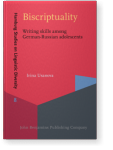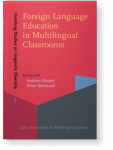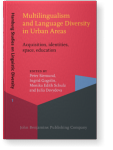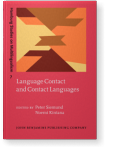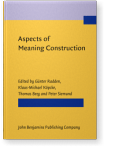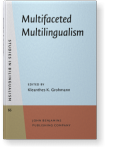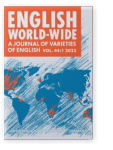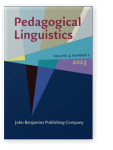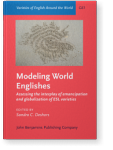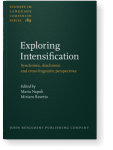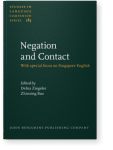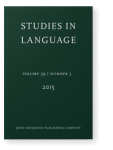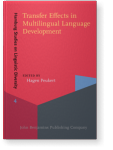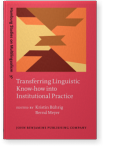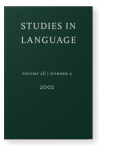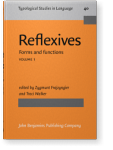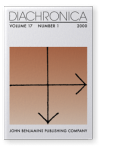Peter Siemund
List of John Benjamins publications for which Peter Siemund plays a role.
Book series
Foreign Language Education in Multilingual Classrooms
Edited by Andreas Bonnet and Peter Siemund
[Hamburg Studies on Linguistic Diversity, 7] 2018. viii, 423 pp.
Subjects Applied linguistics | Language acquisition | Language teaching | Multilingualism
Multilingualism and Language Diversity in Urban Areas: Acquisition, identities, space, education
Edited by Peter Siemund, Ingrid Gogolin, Monika Edith Schulz and Julia Davydova
[Hamburg Studies on Linguistic Diversity, 1] 2013. ix, 379 pp.
Subjects Applied linguistics | Language acquisition | Language teaching | Multilingualism
Language Contact and Contact Languages
Edited by Peter Siemund and Noemi Kintana
[Hamburg Studies on Multilingualism, 7] 2008. x, 358 pp.
Subjects Contact Linguistics | Historical linguistics | Multilingualism | Sociolinguistics and Dialectology
Aspects of Meaning Construction
Edited by Günter Radden, Klaus-Michael Köpcke, Thomas Berg and Peter Siemund
[Not in series, 136] 2007. x, 289 pp.
Subjects Cognitive linguistics | Semantics | Syntax
2024 Chapter 5. Multilingual advantages: On the relationship between type of bilingualism and language knowledge Multifaceted Multilingualism, Grohmann, Kleanthes K. (ed.), pp. 123–151 | Chapter
In this contribution, we provide a critical reassessment of multilingual advantages, especially in the context of learning additional languages. Although there is widespread agreement that multilingual experience enhances language learning, a precise definition of the relevant conditions remains… read more
2023 The ages of pragmatic particles in Colloquial Singapore English: A corpus study based on oral history interviews English World-Wide 44:1, pp. 91–117 | Article
The study aims to work towards a diachronic reconstruction of pragmatic particles in Colloquial Singapore English (CSE, also known as “Singlish”) by exploiting an unused historical data source: The Oral History Interviews held by the National Archives of Singapore (OHI-NAS). We investigate the… read more
2023 Why are they so similar? The interplay of linguistic and extra-linguistic variables in monolingual and bilingual learners of English Pedagogical Linguistics 4:2, pp. 159–194 | Article
This study investigates the relationship between (extra)linguistic variables and proficiency in a foreign language. Based on 1,403 secondary school students in Germany (age 12/13 and 14/15), we assess whether proficiency in German, if applicable also Russian or Turkish, cognitive ability, school… read more
2018 Introduction: Multilingualism and foreign language education: A synthesis of linguistic and educational findings Foreign Language Education in Multilingual Classrooms, Bonnet, Andreas and Peter Siemund (eds.), pp. 1–29 | Chapter
We begin this contribution by briefly explaining the rationale and structure of this volume, but our principal aim here lies in providing a synopsis and synthesis of linguistic and educational approaches to multilingualism and foreign language education in such societal settings. For this purpose,… read more
2018 Modeling World Englishes from a cross-linguistic perspective Modeling World Englishes: Assessing the interplay of emancipation and globalization of ESL varieties, Deshors, Sandra C. (ed.), pp. 133–162 | Chapter
The increasing diversification of English qua World Englishes contributes to cross-linguistic variation. Still, we tend to consider and model varieties of English from a language-internal perspective. Taking Mair’s (2013) World System of Englishes as a starting point, I here explore how to model… read more
2018 Learning English demonstrative pronouns on bilingual substrate: Evidence from German heritage speakers of Russian, Turkish, and Vietnamese Foreign Language Education in Multilingual Classrooms, Bonnet, Andreas and Peter Siemund (eds.), pp. 381–405 | Chapter
An eminent question in current discussions of cross-linguistic transfer concerns the role of previously acquired languages for the learning and acquisition of subsequent languages. While for monolinguals learning a second language it seems obvious that all cross-linguistic influence must be… read more
2017 Chapter 10. English exclamative clauses and interrogative degree modification Exploring Intensification: Synchronic, diachronic and cross-linguistic perspectives, Napoli, Maria and Miriam Ravetto (eds.), pp. 207–228 | Chapter
I here explore the relationship between interrogative degree modification (What a mess!; How awful!) and exclamative clauses like What a wonderful conference we had or How wonderful this conference was. The former are usually viewed as derived from the latter by means of ellipsis. The ellipsis… read more
2017 Towards a diachronic reconstruction of Colloquial Singapore English Negation and Contact: With special focus on Singapore English, Ziegeler, Debra and Zhiming Bao (eds.), pp. 11–32 | Article
Although many grammatical phenomena of Singapore English are well researched, a general picture on the development of Colloquial Singapore English (CSE) over the past few decades has yet to be established. This article intends to address the question if and to what extent Colloquial Singapore… read more
2015 Exclamative clauses in English and their relevance for theories of clause types Studies in Language 39:3, pp. 698–728 | Article
In the present study, I investigate the grammar and usage of English exclamative clauses of the type What a wonderful journey this is! and How wonderful this journey is! Building on existing research, I argue that the exclamative clause type can be motivated both syntactically and… read more
2015 Transfer effects in the acquisition of English as an additional language by bilingual children in Germany Transfer Effects in Multilingual Language Development, Peukert, Hagen (ed.), pp. 147–160 | Article
In this paper, we investigate the language development of children with migration backgrounds who live in Hamburg and are currently learning English as a foreign language in school. With data collected from bilingual Russian-German, Turkish-German, and Vietnamese-German children, we evaluate both… read more
2013 Varieties of English in the EFL
classroom setting Transferring Linguistic Know-how into Institutional Practice, Bührig, Kristin and Bernd Meyer (eds.), pp. 81–94 | Article
An unprecedented case in the history of languages, English has expanded all over the world yielding a variety of unique – und sometimes mutually unintelligible – forms. The immediate repercussion of this observation is that when confronted with regionally marked vernaculars in the EFL setting,… read more
2013 Multilingualism, language contact, and urban areas: An introduction Multilingualism and Language Diversity in Urban Areas: Acquisition, identities, space, education, Siemund, Peter, Ingrid Gogolin, Monika Edith Schulz and Julia Davydova (eds.), pp. 1–16 | Article
2008 Introduction. Language contact: Constraints and common paths of contact induced language change Language Contact and Contact Languages, Siemund, Peter and Noemi Kintana (eds.), pp. 3–11 | Article
2007 Introduction. The construction of meaning in language Aspects of Meaning Construction, Radden, Günter, Klaus-Michael Köpcke, Thomas Berg and Peter Siemund (eds.), pp. 1–15 | Article
2000 Intensifiers and reflexives: A typological perspective Reflexives: Forms and functions, Frajzyngier, Zygmunt and Traci Walker (eds.), pp. 41 ff. | Article
2000 The development of complex reflexives and intensifiers in English Diachronica 17:1, pp. 39–84 | Article
SUMMARY Based on some well-established insights into the historical development of English and on a broad typological survey of the relevant domain, an analysis of the development of reflexive anaphors is provided, which raises and answers a number of new questions. The traditional assumption that… read more
